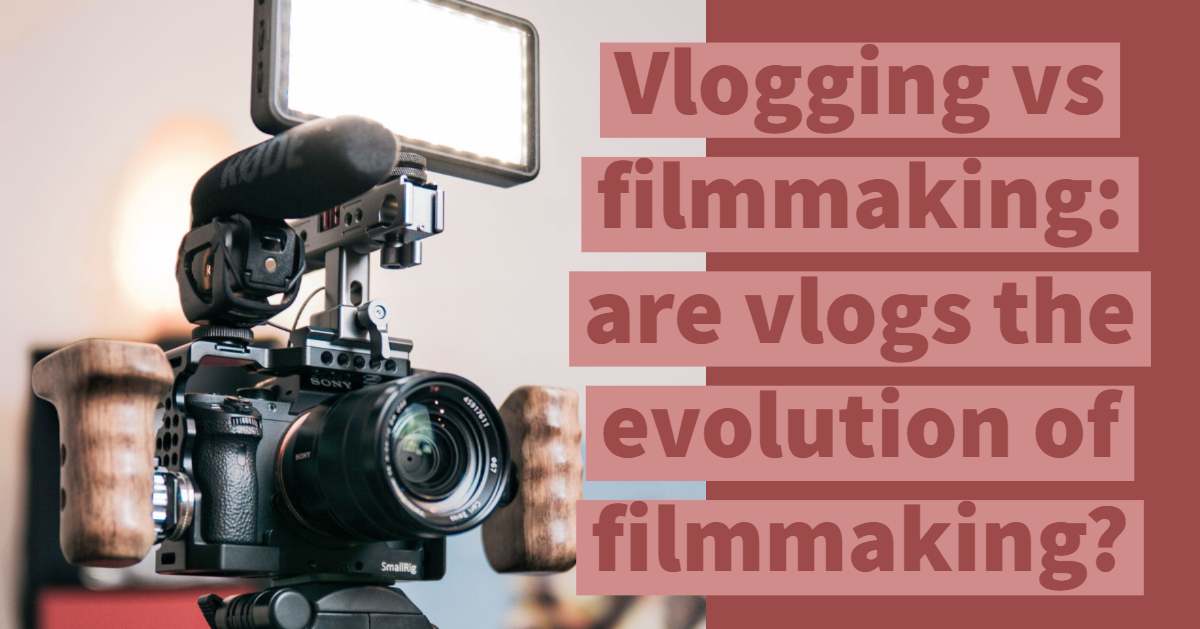
Except for the obvious cases, in 2019 each and every human being on the planet has a possibility to film something and show it to the audience by the means of the internet. Whether you investigated and uncovered blood diamond trade in Africa or just filmed your cat waking up, both videos today have the right to life and existence within the boundlessness of the Internet. However while the former get nominated and win Best Documentary awards, the latter always rapidly sink into oblivion. The question is whether everything that has been filmed can be called a film and if these new evolving video-content production means can be called filmmaking.
To dot the i’s and cross the t’s, a production expert from RedRockEntertainment.com reviews and insists on the importance of differentiating the terms from the headline: vlogging vs filmmaking, and film vs vlog. Let’s begin from the roots. Filmmaking is the process which consists of a wide number of sub-processes (such as scriptwriting, casting, developing, and editing) and results in the creation of a film. Film, in this definition, is “a series of moving pictures, usually shown in a cinema or on television and often telling a story,” according to the Cambridge dictionary. Vlogging is generally understood as posting of non-mainstream videos on the internet; here vlog means a personal website or a social media account where the owner posts short videos about their life. So while filmmaking focuses on the development of a final product – film, the vlogging process is mainly about posting videos (that may or may not have a theme, an idea, etc.) for the mere purpose of entertainment.
Filmmaking and vlogging are different in the nature of their final goal: filmmakers aim at creating a unique artistic project to influence, surprise, inform, or merely entertain the masses; vlogging, at the same time, is mostly (note that “always” was not used in this context) about entertainment without the deep meaning or thought put into these short videos. However, if one would compare filmmaking and vlogging from the technical (production) point of view, then there can be found much more similarities than one would have imagined.
Recollect on the French ‘Verite’ movement which puts reality over fiction and usually includes talking-head shots. Remember about the British ‘Free cinema’ movement that emphasizes the liberation of the current constraints of fiction and traditional story-telling narration. And do not forget about the ‘Dogma’ movement which focuses on the purity of stripped-down filmmaking without the fancy cameras, artificial light, actors, and even scripts. These three movements were mentioned in the book of Scott MacKenzie called Film Manifestos and Global Cinema Cultures: A Critical Anthology and all of them were related to filmmaking. However, if one analyzes the stances of all three, they find the response in vlogging as well. Vlogging is frequently made with phones and without anything else which is the idea of ‘Dogma’; its focus on the real-life events makes it close to the French ‘Verite,’ and the absence of narration makes it a part of ‘Free cinema’ of the Brits.
Besides that, vlogging as a genre emerged only in 2000 while filmmaking has been on the scene since 1985 when the Lumière brothers organized the first screening of their shorts. Mostly vlogs remind me of the very earliest experiments in cinema, people used to just shoot any old thing, a guy knocking a wall down, a train pulling into a station. The latter in the beginning was about ordinary things: how people were building the wall, how someone fails to date a girl, etc. The era of vlogging follows the path of filmmaking: it is still at the stage of trial and errors. The authors are looking for their path and hence experiment a lot.
Vlogging is the evolution of filmmaking with respect to the process and not the final product. The stages of vlogging continue to evolve: from scripts and great technological basis to post-production and meaningful content. However, the narration in vlogs differs from the narration in traditional cinema. According to Gary Collins, the CEO of Red Rock Entertainment Ltd., films have the completed narrative with its beginning and end, its idea and some morality; but this all is related to the fictional projects. When it comes to documentaries, for example, they get much closer to vlogs. They also describe the real-time events and some hot topic, just as vlogs do. Yet vlogs focus on lighting up the problems here and now in contrast to documentaries which still require a lot of time and post-production for completion.
The bottom line
Films and video content in general has suffered impossible transformations since the era of the internet has swept the planet. There are about 300 videos uploaded to the internet every second. Since the demand of the audience changes, the filmmaking industry needs to change as well. And if vlogs are not called the continuation of film, then this genre of video content is likely to evolve into something even bigger than films since it is more accessible and easier to understand that the traditional art of cinema.

